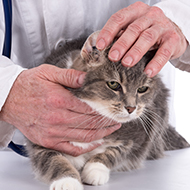
The VMD has issued a warning after continued reports of adverse events.
The VMD is receiving reports of adverse events occurring in cats after off-label use of the ear gel Osurnia.
In a letter to Vet Times (Volume 51, Issue 34). Anne-Sophie Kennedy, from the pharmacovigilance, surveillance division of the VMD, issued a warning to veterinary professionals following continued reports of adverse affects.
Used to treat acute otitis externa in dogs, the product, as Kennedy wrote, “has not been evaluated in cats,” for safety and efficacy.
On the Summary of Product Characteristics (SPC), under section 4.5 'special precautions for use', it states that: “Post-marketing surveillance shows that the use of the product in cats can be associated with neurological signs (including Horner’s syndrome with protrusion of membrane nictitans, miosis, anisocoria, and internal ear disorders with ataxia and head tilt) and systemic signs (anorexia and lethargy.)
“The use of the veterinary medicinal product in cats should therefore be avoided.”
In the letter, Kennedy highlights the importance of a full risk:benefit analysis and gaining informed consent prior to any off-label use of Osurnia in cats, in accordance with the cascade.
Kennedy also writes of the critical nature of reporting adverse events to the VMD, using its online form, and reminds anyone reporting adverse events to ensure that details of previous products administered before the adverse events occurred are included.



 Zoetis has launched a new survey to identify management techniques for Equine Herpes Virus (EHV).
Zoetis has launched a new survey to identify management techniques for Equine Herpes Virus (EHV).